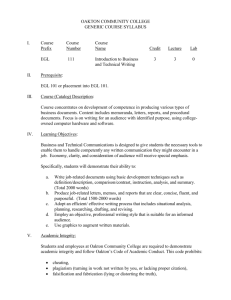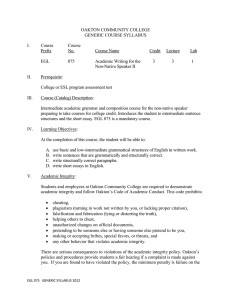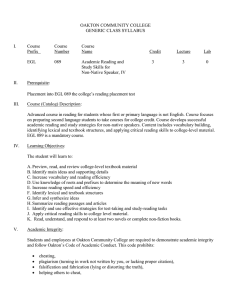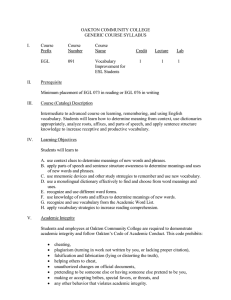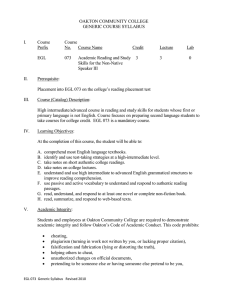OAKTON COMMUNITY COLLEGE GENERIC COURSE SYLLABUS I.
advertisement
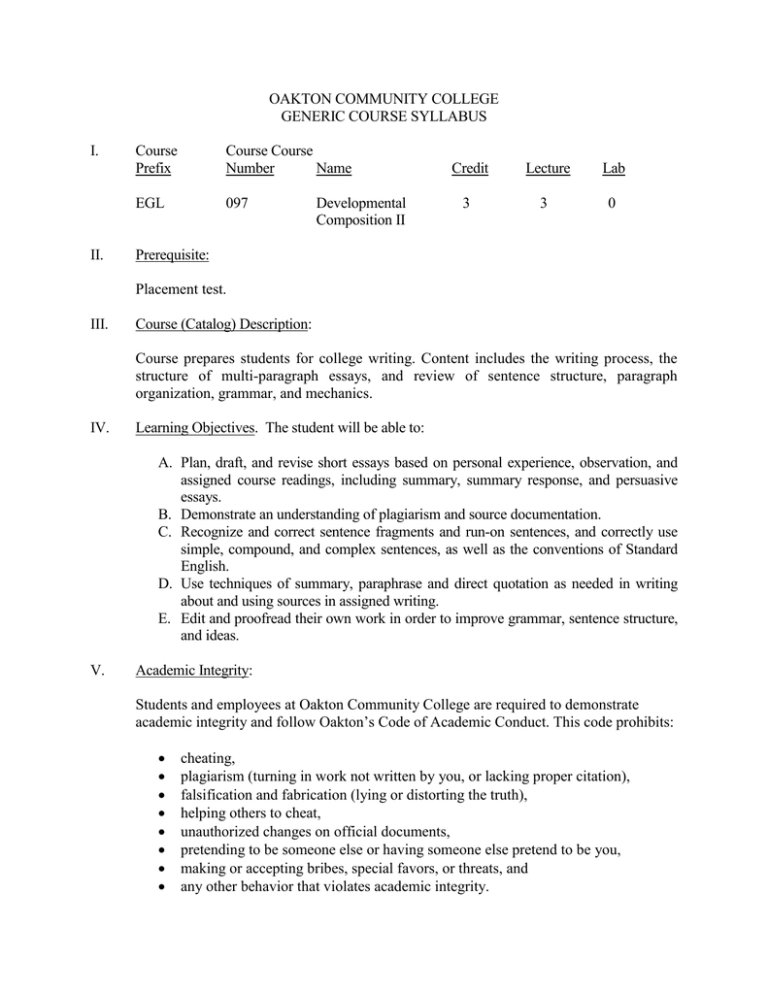
OAKTON COMMUNITY COLLEGE GENERIC COURSE SYLLABUS I. II. Course Prefix Course Course Number Name EGL 097 Developmental Composition II Credit Lecture Lab 3 3 0 Prerequisite: Placement test. III. Course (Catalog) Description: Course prepares students for college writing. Content includes the writing process, the structure of multi-paragraph essays, and review of sentence structure, paragraph organization, grammar, and mechanics. IV. Learning Objectives. The student will be able to: A. Plan, draft, and revise short essays based on personal experience, observation, and assigned course readings, including summary, summary response, and persuasive essays. B. Demonstrate an understanding of plagiarism and source documentation. C. Recognize and correct sentence fragments and run-on sentences, and correctly use simple, compound, and complex sentences, as well as the conventions of Standard English. D. Use techniques of summary, paraphrase and direct quotation as needed in writing about and using sources in assigned writing. E. Edit and proofread their own work in order to improve grammar, sentence structure, and ideas. V. Academic Integrity: Students and employees at Oakton Community College are required to demonstrate academic integrity and follow Oakton’s Code of Academic Conduct. This code prohibits: cheating, plagiarism (turning in work not written by you, or lacking proper citation), falsification and fabrication (lying or distorting the truth), helping others to cheat, unauthorized changes on official documents, pretending to be someone else or having someone else pretend to be you, making or accepting bribes, special favors, or threats, and any other behavior that violates academic integrity. Generic Course Syllabus EGL 097 Page 2 There are serious consequences to violations of the academic integrity policy. Oakton’s policies and procedures provide students a fair hearing if a complaint is made against you. If you are found to have violated the policy, the minimum penalty is failure on the assignment and, a disciplinary record will be established and kept on file in the office of the Vice President for Student Affairs for a period of 3 years. Details of the Code of Academic Conduct can be found in the Student Handbook. VI. Sequence of Topics: Sample sequence: 1. 2. 3. 4. 5. 6. 7. 8. 9. Review of audience and purpose in planning writing Review of elements of the writing process Review of paragraph structure, transitions Review importance of focus or main idea in writing and revision Memoir or observation essays based on personal experience Techniques of analysis of main idea, structure in assigned writing Writing summary Using paraphrase, quotation Arguments, responses, and other types of expository writing based on assigned readings Topics in grammar and mechanics, to be taught concurrently: 1. Spelling, homonyms 2. Subject-verb agreement 3. Sentence types: simple, compound, complex 4. Fragments 5. Run-ons 6. Pronoun agreement 7. Pronoun reference 8. Punctuation 9. Capitalization 10. Diction: wordiness, cliché 11. Parallelism VII. Methods of Instruction: Course may be taught as a face-to-face, media-based, hybrid, or online course. Methods of presentation will vary among instructors: some prefer traditional classroom procedures (lectures, discussion, class exercises); others prefer individualized one-to-one instruction in a modified lab setting. VIII. Course Practices Required: Document1 Generic Course Syllabus EGL 097 Page 3 Planning, drafting, and revising of several essays of varying length, for a minimum of 3000 words, not including drafts. Reading and analysis of short texts, including models of the essays assigned. Journal writing, peer review, quizzes and in-class writing assignments. IX. Instructional Materials: Note: Current textbook information for each course and section is available on Oakton’s Schedule of Classes. Check with the chairman for current list. X. Methods of Evaluating Student Progress: A. At least 50% of the grade will be based on the final drafts of out of class writing assignments. Ten percent of the grade will be based on attendance and participation. Forty percent of the grade will be based on in class assignments. B. Instructors will provide a rubric which explains how essays will be evaluated. C. Students must earn a grade of 70%, and submit a final portfolio of all formal papers to pass the course and move to EGL 101. XI. Other Course Information: A. Attendance policy B. For whatever information/procedures the instructor holds the student accountable. C. If you have a documented learning, psychological, or physical disability you may be entitled to reasonable academic accommodations or services. To request accommodations or services, contact the Access and Disability Resource Center at the Des Plaines or Skokie campus. All students are expected to fulfill essential course requirements. The College will not waive any essential skill or requirement of a course or degree program. Effective beginning term: Spring 2016 Syllabus prepared by: Revised by: Date: Lynn Woodbury Reviewed by Chair: Lynn Woodbury Document1 Ending term: Date: August 24, 2015 Date: August 24, 2015 Generic Course Syllabus EGL 097 Approval by Dean: Linda A. Korbel Document1 Page 4 Date: August 24, 2015
